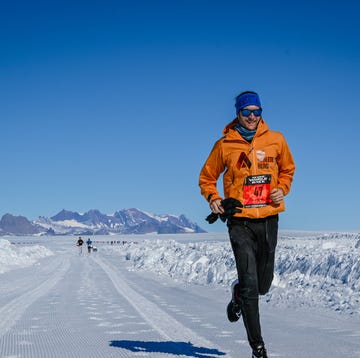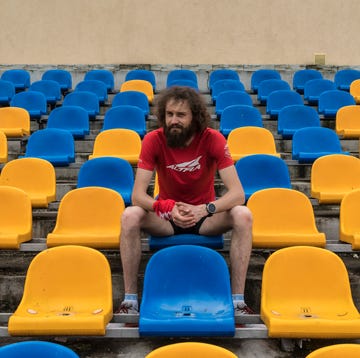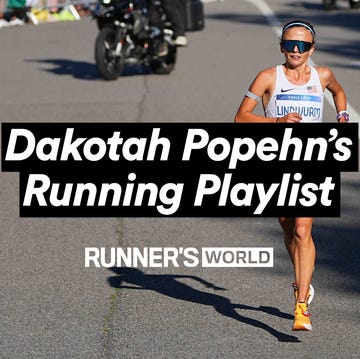Health - Injuries New Balance, Runner’s World is exploring what it means to Run Your Way—whether that’s through overcoming injuries, seeking mental balance, or chasing a new PR. Below, NYC-based runner Vicky Conroy tells us about her return to running after multiple stress fractures and how her relationship with the sport evolved along the way.
This can’t be happening again. Vicky Conroy was in the final stages of training for a marathon in London when she felt a pain in her leg. This was to be her first marathon—she’d originally planned to run one in New York City but had been diagnosed with a stress fracture in her pelvic bone just one month before the race. She’d rested, recovered, and trained herself back into marathon shape.
Now, two weeks before her second attempt at 26.2 miles, Conroy’s body was again telling her that something wasn’t right. Doctors soon confirmed her fear: another stress fracture, this time in her femur.
Advertisement - Continue Reading Below
Prior to her injuries, Conroy’s marathon aspirations began in earnest while she was living with her parents during the pandemic. Like so many runners, she first took up the sport as a way to stay active while cooped up inside. She began posting daily vlogs of her journey, and gradually amassed a community of followers drawn to her honest accounts of becoming a runner. “I began by running a few times a week just for fun,” she says. “Things slowly ramped up from there.” Then she signed up for a half marathon, completed it, and set her eyes on additional races—and eventually completed four half marathons.
Conroy took the next step toward 26.2 miles when she moved to New York City after the pandemic and joined up with Endorphins Running, a community sponsored by New Balance that promotes positivity through exercise. “The founder of Endorphins had seen some of my videos about my half marathon training journey and invited me to a group run,” she recalls. “With running, you automatically have something to talk about. I was in my 20s and had just moved to a new city; I didn’t really know anyone. Joining Endorphins was an incredible way to meet friends right off the bat.”
Boostered with the confidence that comes with a supportive community to socialize and train with, she began preparing to run her first full marathon. “We had a group training program,” Conroy says. “And I started getting kind of ambitious with the training. I signed up for a marathon and was like, I’m gonna do this.”
The First Stress Fracture
Her momentum was building when suddenly things came to a screeching halt. “I completed my 20-mile training run and knew something didn’t feel right,” she says—and then just a month before the race, Conroy was diagnosed with the stress fracture in her pelvic bone. Her doctors recommended two months of complete rest: “No running, no weight, nothing.”
The required period of rest proved a significant mental challenge. “I had done all the training, and I was so close,” she says. “All of my friends were running the marathon, and I wasn’t supposed to put any weight on my leg. It felt like a heartbreak.” But even though she wasn’t running, her community was there to make sure she wasn’t alone. “They were all reaching out to me to make sure I was okay. I got to cheer them on during the marathon, and I know that they’ll return the favor when it’s my turn to run.”
Once she was given the all-clear to begin physical therapy, Conroy began working herself back into marathon shape. “When you’re recovering from a stress fracture like the one I had, the goal is to strengthen the bone and the muscle around it while also working on running mechanics,” she says. “I did a lot of strength training and a lot of cardiovascular exercises on the stationary bike and the elliptical, since they don’t require you to put weight on your bone. I was also lucky enough to have access to an anti-gravity treadmill, which allowed me to run without putting pressure on my legs. Then, when I was cleared to begin working out on hard ground, I started with run-walks and built back to full runs from there.”
Another Setback
Once Conroy was cleared to begin running again, she almost instantly set her eyes on a marathon in London. “I just wanted this distance so badly,” she says. “I had a training coach, and I thought I was doing everything right.” Again, she trained right up to the precipice of the race. But once again, she felt something that wasn’t right as she finished that late-stage session. “It was the same situation, but this time I was diagnosed with a stress fracture in my femur,” she says. “It was too much, too soon.”
This fracture wasn’t as severe physically as the first—but it was even more challenging mentally. “I couldn’t believe it,” she says. “I was in denial at first, realizing that I’d have to tell everyone this, both my in-person and my online community. It wasn’t necessarily embarrassment, but I just really didn’t want to have to do that again.” But as before, her community rallied around her. “So many people were reaching out to me with recommendations and telling me their their own injury stories, like, ‘I’m recovering from this too!’”
And that helped Conroy start to get past this latest setback. “I tried to plan something every day to keep my mind active, like meeting a friend for coffee, or keeping myself busy with work,” she says. “Gradually it got easier. I already had my ticket to London, so I decided to go with my friends and cheer them on. Once I returned home, I was ready for physical therapy again.” She worked her way back into running shape once more—but this time she decided that she was going to change her approach, prioritizing fun instead of the finish line.
Running for Fun Again
Now that she’s made it through these challenges, Conroy’s relationship with running has evolved to a healthier place, she says: “I still plan to run a marathon, but I’m not going to rush into it. I’m truly running for fun now.” She emphasizes that the go-go-go mentality, the “run more miles, run faster,” attitude that’s so enticing to runners in the initial stages of falling in love with the sport, can be at odds with what’s truly important: listening to your body. “Your body keeps score, and it’s going to tell you when it’s time to slow down or stop,” she says.
CA Notice at Collection have pushed yourself too far, she says, treat it as a learning experience: “It’s okay to look back and recognize that mistakes have been made. You can then take that knowledge and move forward with it. You’re gonna come out on the other end of this journey stronger than before.”






















